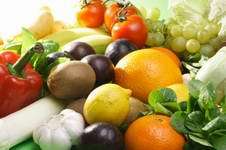What do you do, when your child, or teenager, has come home, and said that they no longer want to eat meat, and you’re left wondering how you’re going to deal with feeding them? Relax – this is survivable. Make sure you respect their choice, as there’s every chance that they’re not just doing this to be annoying.
Contrary to much hearsay and myth, vegetarians can get all the nutrition they need from a simple diet, which doesn’t involve shopping at strange, out-of-the-way places, or going where no person has gone before. These days, there’s a huge amount of information available about vegetarianism, so mealtimes needn’t be a nightmare. Without making it sound like a punishment for their decision, ask your teenager or child – if he/she is old enough – to help you with their choice. It’s their responsibility too to try and help themselves, and maybe they can start by going on the internet, and searching for some simple recipes that the whole family can eat. If the words ‘vegetarian recipes’ is entered into Google, you’ll be overwhelmed with offerings. One good website is Sanitarium’s (www.sanitarium.co.nz), where you can check out their recipes, some of which incorporate their nutmeat and mock-meat products, which are stocked in the canned foods section in most supermarkets. Approached in the right way, your teenager might even help with some of the preparation for the recipes they come up with.
If the internet isn’t an option, advice can be got from The Vegetarian Society, ph: 523-4686. There is also a wealth of vegetarian recipe books available from the Vegetarian Society, bookstores and the library. One example of a good starter book is ‘Very Easy Vegetarian Cookbook’, by Alison and Simon Holst.
Like everyone, at the end of the day vegetarians too want to make a meal that’s quick and easy to prepare, and some find that mock-meat products can be of assistance with this. Many supermarkets, including Pak’n’ Save, stock vegetarian sausages, hot dogs, burgers and patties in their chiller and freezer sections. In the chiller, look for Bean Supreme and Sanitarium vegetarian sausages, hot dogs, soy fillets and soy rashers, and in the freezer look for the Fry’s and Hungry range. If you do want to go further afield, Blissful and Tofu Shop sell a wide range of good quality Asian-made mock-meats. Both shops have more than one location, or outlet, and are in the Auckland phone book.
As far as actual nutrition goes, here is some basic information about the most common areas of concern, and some commonly available foods for a vegetarian to get their nutrition from:
Protein: Most plant foods contain protein, but unlike animal proteins, plant proteins may not contain all the essential amino acids in the necessary proportions. However, a varied vegetarian diet ensures that all protein requirements are easily met, and it’s not even necessary to have all the amino acids present in one meal. The body keeps a short-term store of them anyway, so whatever a meal lacks can be topped up from our body’s store, and replenished again in another meal. People can have different levels of protein requirement, but this is still easily attainable through a vegetarian diet. Some good sources of vegetarian protein are: Chick-peas, Beans & Pulses, Lentils, Baked Beans, Tofu, Soya Milk, Cow’s Milk, Cheese, Muesli, Eggs, Nuts, Wholegrain Bread.
Iron: Dietary iron exists in two different forms – Haem and non-Haem. Haem exists only in animal tissues, whilst in plant foods, iron is present as non-Haem. Non-Haem is less easily absorbed by the body than Haem, however, in spite of this, research has shown that vegetarians are no more likely to suffer from iron deficiency, than non-vegetarians. In fact, research has also shown that lowered levels of iron in the diet, actually result in improved absorption. Some good sources of iron are: Chick Peas, Beans and Pulses, Baked Beans, Bran Flakes, Spinach, Muesli, Dried Fruit.
Calcium: This is present in a wide range of foods, and some good sources are: Chick Peas, Baked Beans, Tofu, Soya Milk, Cow’s Milk, Cheese, Spinach, Broccoli, Dried Fruit, Nuts and Seeds.
Vitamin B12: Currently, nutritional consensus is that no plant foods are a reliable source of B12, so eggs, dairy products, or supplementation, remain the best sources. However, the fermentation process of yoghurt, and boiling milk destroys much of the B12. Many foods, such as Marmite and some soy milks are now fortified with B12, so adequate supplies shouldn’t be a problem.
More information is available from the Vegetarian Society, ph: 523-4686, email: info@vegetarian.org.nz , web: www.vegetarian.org.nz .
Courtesy of Jenni Lyuk.









Join the Discussion
Type out your comment here:
You must be logged in to post a comment.